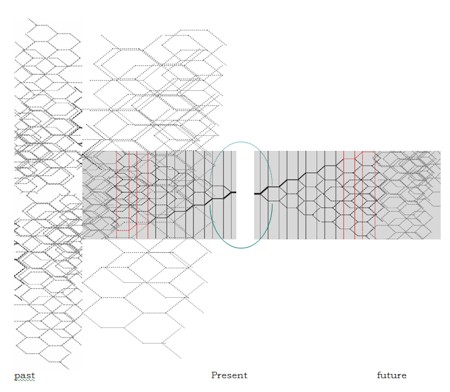
The Living Field: My always-provocative friend Mushin describes the concept of the living field as “[the area in spacetime] within and between living beings. It surfaces as meaning, inner depth, beauty, healing, empowerment, solidarity, mutuality… participation, engagement and collaboration”. It is our self-organized, collective experience and consciousness of and connection and resonance with all-life-on-Earth. When the living field is coherent, he says, its resonance is (among other things) how nature conveys information. The graphic above illustrates the resonance in the living field between two creatures, in space and time, and it reminds me very much of Andrew’s “Lightening Branches” drawing of Now Time (below). Where could we go with this? Sustainability AND Resilience: Although the author of this article makes sustainability vs resilience out to be a bit of an either/or proposition, his list of eight principles of resilience is an excellent one. The steps we take to become more resilient in an ever-changing world must complement and supplement the steps we take to create communities and organizations that are more sustainable. Thanks to Lance Turner for the link. The eight principles:
Unschooling Our Way to a Sustainable and Resilient Economy: PS writes: “I spend a lot of time thinking about the ways in which the industrial economy might give way to a natural economy. I wonder what will it take to move from a culture of exploitation to a culture of reciprocity. To move from a culture of abuse to a culture of care for people and places and living things. What will have to change?” She argues that unschooling is a necessary precondition for this change. Macroscopic Journalism: Tom Atlee writes, quoting Peggy Holman: “microscopes are for seeing what’s too tiny for ordinary seeing, telescopes are for seeing what’s too far away for ordinary seeing, and macroscopes are for seeing what’s too complex for ordinary seeing“. Is it possible, Tom and Peggy muse, to retrain journalists to write macroscopically — in such a way that we understand the context, what it all means, how it affects us, and what we can and should do about it? By the way, Tom’s blog, based on the Posterous platform, is updated entirely by e-mail — if you think blogging is too hard to do, check out this tool! The Road From Here to There: Imagination + Collaboration: Dave P describes a simple imaginative idea, deployed collaboratively, that makes a big difference: A call-in number that allows volunteers to come and pick fruit off your trees, with 1/3 going to the owner/grower, 1/3 to the picker, and 1/3 to the local food bank. I’m aware that this system has been used in several other places, so clearly it has viral power. What could you do in your community, with a little imagination and collaboration, that would yield important results with very little effort? What’s Involved in Living Sustainably: Sharon A describes a week in the life of someone living sustainably, and offers a 6-week course (starts August 6) in doing so yourself. Thanks to Dwig for the link. Course outline:
The Courage to Move On: A couple that’s been working for three years to live sustainably decides they are in the wrong place to create a whole sustainable community, and are now packing up to start over in a more hospitable place. Thanks to Dave P for the link. Activism Offsets: What If You’re Too Busy or Scared to Protest?: A new website is organizing thousands of people for global warming protests, and urging those not able or willing to attend and risk arrest to contribute to “activism offsets” to support and bail out those who can. Thanks to Chris C for the link. The Future of RSS Feed Readers: An interesting discussion of how we’re learning to cope with information overload. Look at how many of the links in this post come from my readers, rather than from my own reading, and you’ll see how I’m coping. Thanks to Jodene for the link. Fun and Inspiration: In case you missed them in the Mushin link above, here are two extraordinary videos that require no words:
Learn to Fly, a 4-minute film by Christian Letruria showing (endangered) South African blue cranes learning to fly, and a first successful flight.
The Struggle for Pleasure, a 4-minute mashup of music of Wim Mertens with excerpts from the Robin Williams/Cuba Gooding Jr. movie What Dreams May Come Fifteen amazing microscopic images from inside the human body.
Thoughts for the Week: From Charles Bowden in Blood Orchid (thanks to Beth T for the link):
We are an exceptional model of the human race. We no longer know how to produce food. We no longer can heal ourselves. We no longer raise our young. We have forgotten the names of the stars, fail to notice the phases of the moon. We do not know the plants and they no longer protect us. We tell ourselves we are the most powerful specimens of our kind who have ever lived. But when the lights are off we are helpless. We cannot move without traffic signals. We must attend classes in order to learn by rote numbered steps toward love or how to breast-feed our baby. We justify anything, anything at all by the need to maintain our way of life. And then we go to the doctor and tell the professionals we have no life. We have a simple test for making decisions: our way of life, which we cleverly call our standard of living, must not change except to grow yet more grand. We have a simple reality we live with each and every day: our way of life is killing us.
From Derek Walcott (thanks to Tree for the link, and the one that follows):
LOVE AFTER LOVE
The time will come and say, sit here. Eat. all your life, whom you ignored the photographs, the desperate notes, From Jan L. A. van de Snepscheut:
In theory, there is no difference between theory and practice.
But, in practice, there is. From David Watson, the Pathology of Civilization (thanks to Bonnie for the link):
We reproduce catastrophe because we ourselves are traumatized – both as a species and individually, beginning at birth. Because we are wounded, we have put up psychic defenses against reality and have become so cut off from direct participation in the multidimensional wilderness in which we are embedded that all we can do is to navigate our way cautiously through a humanly designed day-to-day substitute world of symbol— a world of dollars, minutes, numbers, images and words that are constantly being manipulated to wring the most possible profit from every conceivable circumstance. The body and spirit both rebel.
|





